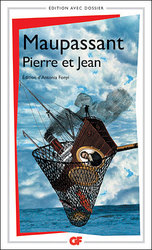
Maupassant gives each moment, linked to a fleeting but powerfully present emotion, a chance for exploration as Pierre modulates from suspicion to denial to jealousy to anger to self-pity. This is very much a novel of psychology, and even though the characters operate from a social and moral perspective that's more than a century old (and a culture removed from this American), every beat seems relatable and right. The weather and setting mirror Pierre's emotions in a way that is both poetic and real, where a clear day of sailing gives way to cold, enveloping fog, much as his private doubts begin to seep in and affect a sunnier outlook:
As he neared the harbor he heard out to sea a mournful, sinister plaint, like the bellowing of a bull, but longer drawn out and more powerful. It was the wail of a siren, the wail of ships lost in a fog… Pierre walked faster and reached the jetty, thinking of nothing now, content to enter this lugubrious, moaning darkness. (trans. Leonard Tancock)
"En approchant du port il entendit vers la pleine mer une plainte lamentable et sinistre, pareille au meuglement d'un taureau, mais plus longue et plus puissante. C'était le cri d'une sirène, le cri des navires perdus dans la brume… Pierre gagna la jetée a grands pas, ne pensant plus a rien, satisfait d'entrer dans ces ténèbres lugubres et mugissantes."
 RSS Feed
RSS Feed